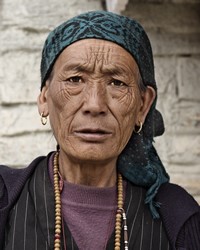The original "Nepalis" came hundreds of years ago from India, Tibet, and Central Asia.In prehistoric days, a Hindu sage by the name of Ne established himself in the Kathmandu Valley, which has always been the center of Nepali civilization. He meditated and taught there. He was also the protector, or "pali," of this land. Thus, the term, Ne-pali began.Nepalis are not defined by language, but by their citizenship and their allegiance to the nation-state of Nepal. Though they have a trade language that has various names, you can't take one language and call it Nepali per se.Nepal is a very poor country. Living in the Himalayan Mountains, most either make their living by the tourist industry or subsistence farming. Farming is tough in mountain terrain.To overcome this situation, many have tried to earn a living abroad. Nepalis live in 22 countries including Kuwait.
Typically, Nepalis in Kuwait are migrant workers. They are trying to make money to send to relatives in Nepal. These individuals work in low-paying jobs, such as construction and restaurants. Nepalis have 75 Nepali organizations in Kuwait. They are centered around sports, caste, or protection in the workplace.There are several customs Nepalis hold no matter where they live. Like most South Asians, they don't show the bottom of their feet; that would be an insult. They don't use their left hand for eating. When invited to be a guest at someone's home, they bring a generous gift.
Nepalis practice Hinduism, the ancient religion of India. Hinduism is a catch-all term for the local religions of South Asia, so it is very diverse. At the popular level, Hindus worship and serve the gods of the Hindu pantheon. They visit Hindu temples and offer prayers, food, flowers, and incense to their gods in hopes of gaining protection and benefits. They do not have a personal or familial relationship with their gods like Christians or Jews. There are other Hindus who are much more philosophical, especially among Brahmins.Nepali Hindus participate in yearly celebrations like Holi, the festival of colors and the start of spring; Diwali, the festival of lights; Navratri, the celebration of autumn; and Rama Navami, Rama's birthday.
Nepalis in Kuwait need advocates. Despite laws that are intended to protect vulnerable migrant workers, Nepalis are often cheated out of their wages. Kuwait no longer allows Nepali women to work as housemaids because of high incidents of sexual abuse. Law enforcement rarely arrests Kuwaiti nationals for such abuse.
Pray for the Holy Spirit to give Nepalis a hunger and thirst for truth and righteousness found only in Jesus Christ.Pray for Nepalis in diaspora to be protected from those who might take advantage of them.Pray that this location will be a place where Nepalis can hear and embrace the gospel.Pray that Nepali Christians will disciple other Nepalis and the Muslims they meet in the workplace.
Scripture Prayers for the Nepali, general in Kuwait.
https://factsanddetails.com/south-asia/nepal/people_nepal/entry-7827.htmlhttps://trip101.com/article/namaste-nepal-7-customs-to-respect-while-in-nepalhttps://en.wikipedia.org/wiki/Nepalis_in_Kuwaithttps://timeskuwait.com/nepali-nationals-in-kuwait-soar-to-107000-and-counting/
| Profile Source: Joshua Project |











